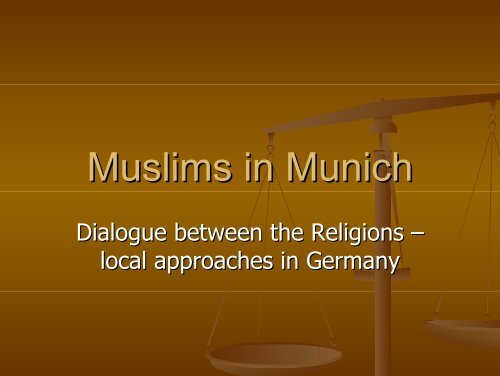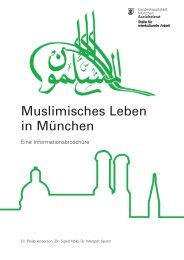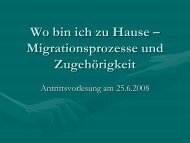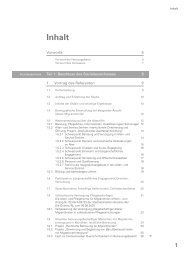Muslims in Munich - Philip Anderson
Muslims in Munich - Philip Anderson
Muslims in Munich - Philip Anderson
You also want an ePaper? Increase the reach of your titles
YUMPU automatically turns print PDFs into web optimized ePapers that Google loves.
<strong>Muslims</strong> <strong>in</strong> <strong>Munich</strong><br />
Dialogue between the Religions –<br />
local approaches <strong>in</strong> Germany
Basic Data<br />
• 3,2 to 3,5 Million <strong>Muslims</strong> <strong>in</strong> Germany,<br />
ca.300,000 <strong>in</strong> <strong>Munich</strong><br />
• Immigration from Turkey and North Africa<br />
• Islam is not a recognised religion<br />
• Organisational form: associations, , ca. 35<br />
mosque associations <strong>in</strong> <strong>Munich</strong>
Islam <strong>in</strong> Europe - History<br />
• Expansion: Spa<strong>in</strong> and the Reconquista<br />
• Expansion and decl<strong>in</strong>e: The Ottoman<br />
Empire, the „sick<br />
man of Europe“<br />
• Post World War II: „secular„<br />
secular“ work<br />
migration<br />
• From 1990s <strong>in</strong>creas<strong>in</strong>g religious dimension<br />
of the Muslim Diaspora
<strong>Muslims</strong> <strong>in</strong> German Cities<br />
• Associations are a form of „home„<br />
home“ abroad<br />
• Self-help<br />
groups with a pioneer character<br />
• In the course of migration the associations<br />
have <strong>in</strong>creased <strong>in</strong> importance<br />
• Formerly „back-yard“ mosques, now<br />
<strong>in</strong>creas<strong>in</strong>gly „representative“ build<strong>in</strong>gs (ca.<br />
300)
Increas<strong>in</strong>g Controversy s<strong>in</strong>ce the<br />
90 s Why?<br />
• Rise of fundamentalism worldwide<br />
(Christian and Muslim, Jewish, sects)<br />
• End of „East„<br />
East-West<br />
conflict“ “ and an end of<br />
„Bi-polarity“<br />
• In the vacuum: political polarisation and<br />
an „<strong>in</strong>strumentalisation„<br />
<strong>in</strong>strumentalisation“ “ of religion, e.g.<br />
Al-Qaida<br />
• Islamist critique is post-colonialist<br />
reaction<br />
to Western ascendancy
Why (2)<br />
• Deep ambivalence toward the values of<br />
the West. Admiration and humiliation are<br />
two sides of the same co<strong>in</strong><br />
• Symbolic importance of Israel-Palest<strong>in</strong>e<br />
Conflict as viewed by many <strong>Muslims</strong><br />
• Radicalisation and the role of terror s<strong>in</strong>ce<br />
9/11
Social policy background:<br />
Exclusion<br />
• Language problems, school performance<br />
(PISA), limited qualification options<br />
• Unemployment, low-paid<br />
jobs,<br />
discrim<strong>in</strong>ation, low social prestige<br />
• Religion provides identity,support of a<br />
sense of „otherness„<br />
otherness“,<br />
comb<strong>in</strong>ed with pride<br />
• = socially explosive mix
Dialogue Approach: Muslim Round<br />
Table<br />
• Social policy and everyday topics: support<br />
for education, care of the sick and dy<strong>in</strong>g,<br />
Islamic burial areas etc.<br />
• Current controvesies: Build<strong>in</strong>g of new<br />
mosques and promot<strong>in</strong>g tolerance, or:<br />
clear distanc<strong>in</strong>g from terror acts<br />
• Local community attitudes: from active<br />
dialogue to aggressive rejection
Other places <strong>in</strong> Germany<br />
• Often controversies around new mosques:<br />
deep-seated<br />
fears<br />
• Examples: Lau<strong>in</strong>gen (positive), Pankow <strong>in</strong><br />
Berl<strong>in</strong> (negative)<br />
• October 2008: „The„<br />
Miracle of Marxloh“<br />
(Duisburg)<br />
• <strong>Muslims</strong> are „com<strong>in</strong>g<br />
out of the closet“,<br />
importance of active civil society dialogue<br />
and discussion
National level<br />
• The Islam conference of the Federal<br />
Government (s<strong>in</strong>ce(<br />
2006)<br />
• The importance of religious lessons on<br />
Islam <strong>in</strong> state schools (education:: Länder<br />
responsibility)<br />
• Local authorities and dialogue approach:<br />
Focus of people‘s everyday lives is local
In Conclusion<br />
• Dialogue means needs are expressed,<br />
controversies dealt with<br />
• Integration is about everyone! Thus active<br />
discussions <strong>in</strong>volv<strong>in</strong>g whole community<br />
• Basis for social policy: Participation and<br />
mutual respect are <strong>in</strong>terconnected<br />
• Alternative: Exclusion and the <strong>in</strong>crease of<br />
ethnic and social tensions and potential<br />
civic breakdown
•ManyMany thanks for listen<strong>in</strong>g!






